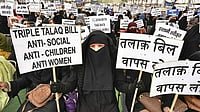Much has already been written and said about the attack on Salman Rushdie on August 12, 2022. I just wish to place certain things in perspective. Coming from a legal system that recognises insults to religion and religious beliefs (Section 295A of the IPC) as a valid restriction on the fundamental right to free speech under Article 19(2), for us the debate should not be about glorifying Rushdie’s exercise of an expansive artistic license, but about criticising vigilante justice as a substitute for due process and punishment prescribed by law. I read The Satanic Verses many years ago because I did not want to be swayed by other people’s opinions. Here are my observations on the book.
Rushdie’s was not an incidental slip or a little artistic flair gone too far. He goes out of his way to insult, belittle and cast doubt. He takes incidents from the life of the Prophet and makes devilish tweaks to them, mocking the Prophet and his companions. He borrows incidents from Islamic history, replaces pure intentions with malicious ones, and makes villains out of heroes. He casts doubt on, nay, denies the divinity of the revelation of the Quran, repeatedly questions the motivations of the Prophet and attributes base motives to him. Rushdie’s insight is the insight of a Muslim who has grown up being taught Islamic history and who understands theology. To that knowledge, he brings to bear the derision of a disbeliever.
In a famous incident in the Mahabharata, Yuvraj Yudhishthir distinguishes himself from the one-size-fits-all justice of Duryodhana, who had condemned all four men found guilty of murder to death, instead meting out punishments based on the level of knowledge and understanding of the guilty, with the highest punishment being meted out to the one who commits a crime after having read and understood the law, and the greatest clemency being shown to the ignorant (keeping the caste angle aside for the moment). By that yardstick, Rushdie’s offence was much greater than the offense committed by the likes of Nupur Sharma, who speak ill of a Prophet they know nothing about. Her wrong was simply compounded by the fact that she was the mouthpiece of a party that is presently in government and had been called upon to speak for them.
If I were to draw a comparison, Nupur Sharma’s rant is the equivalent of a person whose car scrapes against yours in traffic, and who shouts foul-mouthed abuses at you, most of which—as is wont with abuses—are insinuations of incest in your family. No matter how filthy the abuse they heap on you, it is water off a duck’s back after the heat of the moment has worn off. Now compare that to someone who knows your family intimately and insinuates incestuous relations between you and your family elders, addressing each member by name, narrates twisted accounts of actual family gatherings and suggests that those gatherings were the setting in which the incest occurred, and describes the acts in disgusting detail. Which one of those are you more likely to forget, and which are you likely to nurse a grudge about all the way to your grave?
I remember reading Taslima Nasreen’s Lajja for the same reason I read The Satanic Verses, and my first thought was that the book got more importance than it deserved. Nasreen’s account of the atrocities against Hindu minorities in Bangladesh was criticism directed against Muslims, rather than against Islam. Her attribution of the violence and misogyny she witnessed in Bangladesh to Islam was incidental to her account and was nothing more nuanced than name-calling. Wasim Rizvi too wrote insults about the Prophet in his book Muhammad, but besides being poorly written trash that again resorted to name-calling, Rizvi renounced Islam soon after and became Jitendra Narayan Singh Tyagi. Muslims were not nearly as outraged by his book as they were glad to be rid of him.
ALSO READ: Salman Rushdie And The Iran Fatwa
Rushdie, on the other hand, knows exactly what he is doing and draws blood where he strikes. Indians are more sensitive about their religion than most people. And Muslims are more sensitive about their Prophet than they are about anything else. This is because besides God and his Prophet, Muslims have disagreed with each other about pretty much everything else. But oddly enough, we aren’t that sensitive about God. This is best explained by recounting the pre-Islamic incident, where the Prophet’s grandfather, Abdul Muttalib, goes to negotiate with King Abraha, who is camping outside Mecca with his army threatening to demolish the Kaaba. Much to Abraha’s surprise, Abdul Muttalib only asks for his stolen camels to be returned because “I am the master only of those camels, the Kaaba likewise has its Master who will defend it”. So, we mostly leave God to settle his own scores, but we take slights directed at our Prophet very personally. The sentiment is best described by a Farsi saying that goes, “Ba Khuda deewana bash, wa ba Mohammad hoshiyaar” (Say what you want about God, but don’t dare to take liberties with Muhammad). The person of the Prophet is, therefore, pretty much the only common denominator for Muslim sensitivity across the globe. And when an Indian born-Muslim like Rushdie, who knows and understands Muslim sensitivities more sharply than most, so deliberately aims to insult, we have to call the risk he runs at least a calculated one.
The same, incidentally, goes for Munawar Faruqui. Contrary to popular belief, he was not simply targeted for a joke he didn’t crack, but initially attracted the wrath of trolls for the jokes about Hindu deities Rama and Sita that he had cracked at a previous show. Again, as an Indian Muslim who has grown up around our own sensitivity to religious insults, should he not be expected to understand that the law and our societal morality demand that he scrupulously avoids insults directed at gods of any religion? Those are the limits of the freedom of speech our constitutional system allows him. That, incidentally, is also what the religion he was born into demands of him. The Quran categorically states “And do not insult those gods they invoke other than Allah, lest they insult Allah in enmity without knowledge” (6:108). So why must we, as liberals, be called upon to stand up for an unfunny comedian who should have known better, and who may not deserve to be arrested but definitely deserves to be tried for his offense?
Therefore, whatever they do it for, be it fame or glory, money or power, they do it with open eyes. Hindu or Muslim, the religious sensitivity of the unheeding multitude is a beast they know to have a life of its own, and the obligation to avoid hurting these religious sensitivities is a restriction on their right to free speech, at least in India. And merely pointing out that Rushdie suffered no such restriction on free speech in the jurisdiction where he resides suffers from the fatal flaw that the fatwa for his death likewise suffered from no illegality in the jurisdiction where it was given.
So, by the standards of our legal and social morality, which is the only standard we are equipped to employ, Rushdie deserved to be tried and jailed for his book, since it was also briefly distributed in India before being banned. We must therefore decry the taking of the law into his own hands by his attacker, rather than tom-tom his freedom of speech and glorify the so-called art that he created.
(This appeared in the print edition as "Verdict GUILTY")
(Views expressed are personal)
Nizam Pasha is a Delhi-based lawyer



















